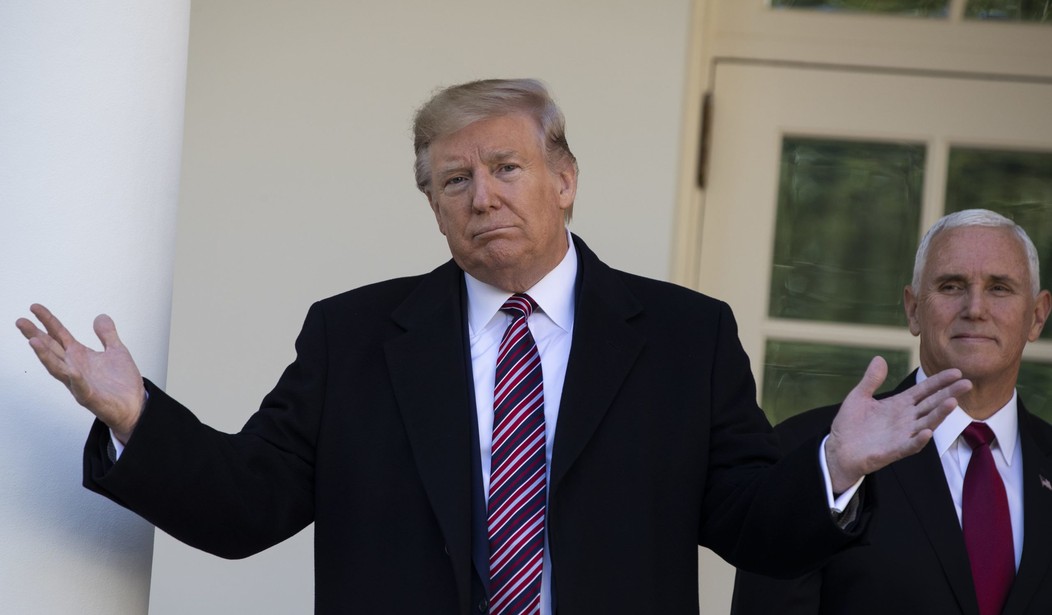Liberal journalists have belatedly realized that social media fact-checking can be used against them, and they’re not happy about it. Not one bit. But it’s hard to have sympathy for them when they finally taste their own medicine.
On Saturday, one of Facebook’s independent fact-checkers, The Daily Caller, determined a Politico story to be untrue, leading to a “False Information” tag on the social media platform. Politico had claimed that President Donald Trump called the coronavirus itself a “hoax,” when, in context, the president was clearly condemning the Democrats’ politicization of the virus.
“The Democrats are politicizing the coronavirus,” Trump said. “One of my people came up to me and said ‘Mr. President, they tried to beat you on Russia, Russia, Russia. That didn’t work out too well.’ They couldn’t do it. They tried the impeachment hoax that was on a perfect conversation. This is their new hoax.”
Naturally, the liberal legacy media latched on to the idea that Trump had called the coronavirus itself a “hoax,” a theme echoed by 2020 Democrats.
Judd Legum, the founder of Think Progress and former campaign staffer for Hillary Clinton, complained about the Facebook fact-check on Twitter.
“Facebook made THE DAILY CALLER an official fact-checking partner. That gives The Daily Caller the ability to label anything posted on Facebook as ‘false information’ and dramatically reduce its distribution. It’s now using that power to boost Trump,” Legum tweeted.
2. On Friday, Politico published an article headlined "Trump rallies his base to treat coronavirus as a ‘hoax.’"
The Daily Caller declared this was "false information." If you try to post the article to Facebook, this is what you see. https://t.co/AoMU8uhDR8 pic.twitter.com/aDS4Ogpo1y
— Judd Legum (@JuddLegum) March 3, 2020
He argued that Politico‘s angle was correct.
“The Daily Caller’s fact check claims that Trump referred only to the Democrats’ politicization of the coronavirus as a ‘hoax’ But that’s not what Trump said,” Legum claimed. “He said: ‘This is their new hoax’ The Daily Caller resolves that ambiguity in favor of Trump.”
The Daily Caller explained that Trump “reiterates his administration is taking the threat of the coronavirus seriously,” which he does in the speech. Legum claimed that Trump “minimizes the threat of the coronavirus.” That is also true: the president sought to allay exaggerated fears about the virus, while at the same time insisting that his administration is taking it seriously. The two positions are not inherently contradictory.
Legum went on to complain that “The Daily Caller’s fact check operation is funded by the Searle Freedom Trust, a major funder of organizations that push climate disinformation and other right-wing causes.”
In other words, it’s beyond the pale for Facebook to use The Daily Caller for fact-checks because this site is funded by a trust that promotes a narrative Legum vehemently disagrees with.
Mike Berry, head of audience at HuffPost, noted the harsh penalties and loss of traffic that come with a Facebook “false” fact-check marking.
“What’s not mentioned here: When a FB-appointed fact-checker gives a ‘false’ or ‘partially false’ rating, it downranks ALL that publication’s content on FB and can destroy a publication’s FB referral for weeks. Facebook lets The Daily Caller choose which sites get FB traffic,” Berry tweeted.
https://twitter.com/MikeElliotBarry/status/1234861055433756679
This does indeed impact a website’s traffic, although what Barry claims isn’t entirely accurate. Only the post that has been flagged as false is downranked. All of a publication’s content is only affected if the page repeatedly shares false information. If the publication corrects the false information, satisfying the fact-checker, then the penalty is lifted.
Regardless, this struggle is nothing new for conservatives. Social media companies, seeking to engage in fact-checking on their platforms, often turn to liberal-leaning outlets like PolitiFact and Lead Stories. (Facebook used to work with Snopes as well). Last July, PolitiFact ruled that a PJ Media article from Jim Treacher was “false.” Treacher had claimed that the viral photos of Rep. Alexandria Ocasio-Cortez (D-N.Y.) weeping on the other side of a fence were not taken at a migrant facility but outside an empty parking lot. The article was rated “false” not because AOC was actually crying in front of migrants, but because the photos were taken by an empty road that led to a facility, not an empty parking lot as Treacher claimed.
Treacher’s basic point — that the photos were staged — remained correct, but the fact-check dinged him, anyway, leading PJ Media to be branded as a purveyor of “false information” on Facebook, just like Politico now faces. A left-leaning fact-checker used a pedantic point to silence a right-leaning news outlet.
I happen to think Politico‘s biased retelling of Trump’s speech does more damage to the facts than Treacher’s misstep, but both cases are instructive.
Politico seized on the ambiguity of Trump’s statement that “this is their new hoax,” and twisted it against him. In context, Politico‘s claim was false. The Daily Caller, which reports on news from a conservative perspective, rightly defended Trump from a biased attack.
Treacher seized on the deception of AOC’s photos but was technically incorrect about what lay on the other side of the bars. Left-leaning PolitiFact seized on this pedantic point and got PJ Media branded as “false information.”
Conservatives have long been angry with Facebook for this kind of misstep, and many welcomed Facebook’s fact-check against Politico. Yet both cases illustrate how difficult it is to fact-check in a partisan news environment.
Following the 2016 election, social media companies are terrified about peddling “fake news.” Internet misinformation is a serious problem, yet most fact-checking sites are not immune from bias, no matter how hard they try — or appear to try. Especially when it comes to issues like climate alarmism, there is a very serious divide in how the left and the right see the basic facts at issue. Liberals cite experts who warn about climate change while conservatives point out how badly these experts failed to predict the impacts of climate change. Who wins the fact-check? It depends on your perspective and the exact words involved.
This is not to say the underlying facts are not important — they are. But bias is endemic in journalism, especially when the left and the right cannot agree on the right place to start.
Facebook’s decision to partner with a conservative outlet for fact-checks is welcome, but I fear the entire enterprise of social media fact-checking is flawed. It is important for readers to know what kinds of sites are trustworthy and which are not, but to what degree is that Facebook’s job in the first place?
Tyler O’Neil is the author of Making Hate Pay: The Corruption of the Southern Poverty Law Center. Follow him on Twitter at @Tyler2ONeil.









Join the conversation as a VIP Member